Cynthia Garcia-Eidell
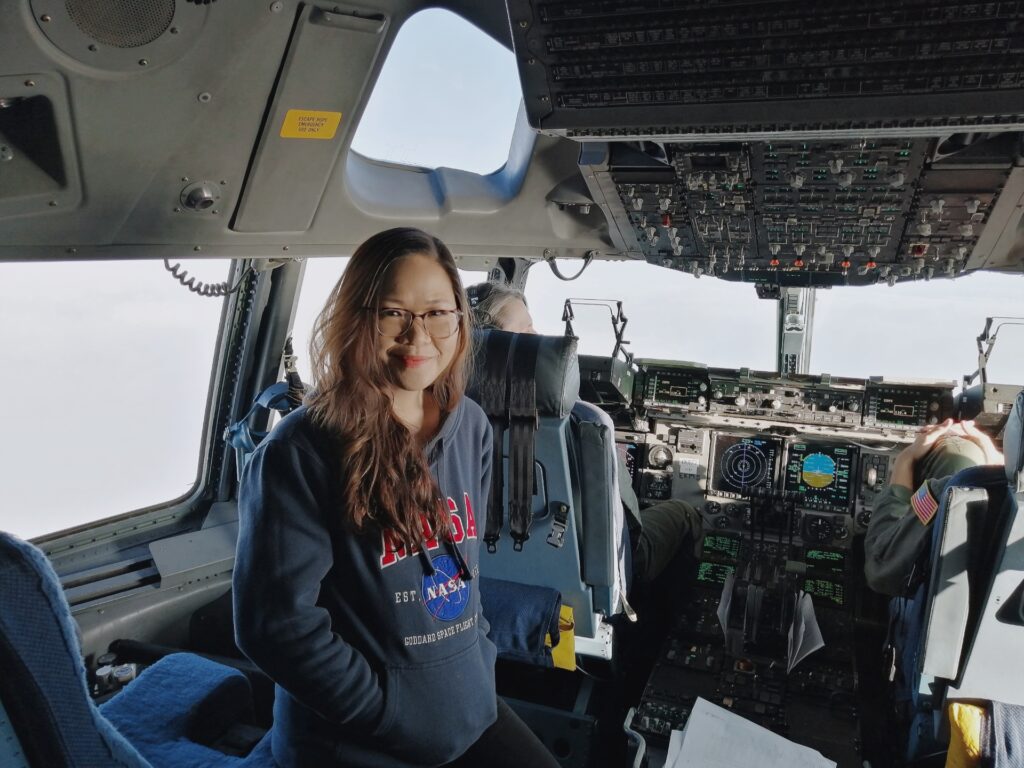
Cynthia Garcia-Eidell (Sin-thee-yah Gar-see-yah Eye-del) is a Knauss Marine Policy Fellow supporting the Global Ocean Monitoring and Observing at the National Oceanic and Atmospheric Administration (NOAA). She is also a Ph.D candidate in Earth and Environmental Sciences at the University of Illinois, Chicago. She is interested in carbon cycle changes along critical fringes of our planet such as coastal margins and marginal ice zones using satellite datasets. She got her M.Eng. in Environmental Engineering from the Catholic University of Korea and a B.S. in Biology from the University of the Philippines. She was trained on satellite data processing and geospatial analysis at the NASA Goddard Space Flight Center where she was previously appointed as a Visiting Scientist. She is passionate about research, science policy, equity, and helping build supportive networks and alliances.
Let’s begin by talking a bit about where you grew up.

I grew up in Amadeo, Cavite* which is fondly known as the ‘Coffee Capital of the Philippines’. We have the largest surface area covered by coffee. In summer, you can smell the mild sweetness of the coffee flowers and the whole town becomes fragrant. After harvesting, the streets of our town are covered with coffee cherries, in all shades of red, green and brown at different stages of drying. The fruit is raked and turned throughout the day to help with the drying process. In the afternoon, you can hear people scraping the coffee from the pavement, trying to make a mound and covering it overnight to protect it from moisture. Then early morning you hear them again scraping the coffee back. In autumn, the entire town is filled with the delicious smell of roasted coffee. A lot of my sensory stimuli growing up had to do with coffee.
Amadeo is in the highlands so we had colder weather, lots of rain and lots of tropical fruit.
*Learn more about Amadeo’s ‘Coffee Festival’ here.
You’ve painted such a beautiful picture of your hometown! What was your childhood like? Do you have any siblings?
I really enjoyed growing up in our town. I’m the youngest of three siblings. My mom was a retired elementary school teacher and my dad a retired police officer. We are a family of educators and civil servants. My grandparents, my sister and my aunt are all teachers. My brother is an engineer. I grew up in an environment where education was very important. For my parents, displaying the diploma of their kids in our house was their biggest pride.
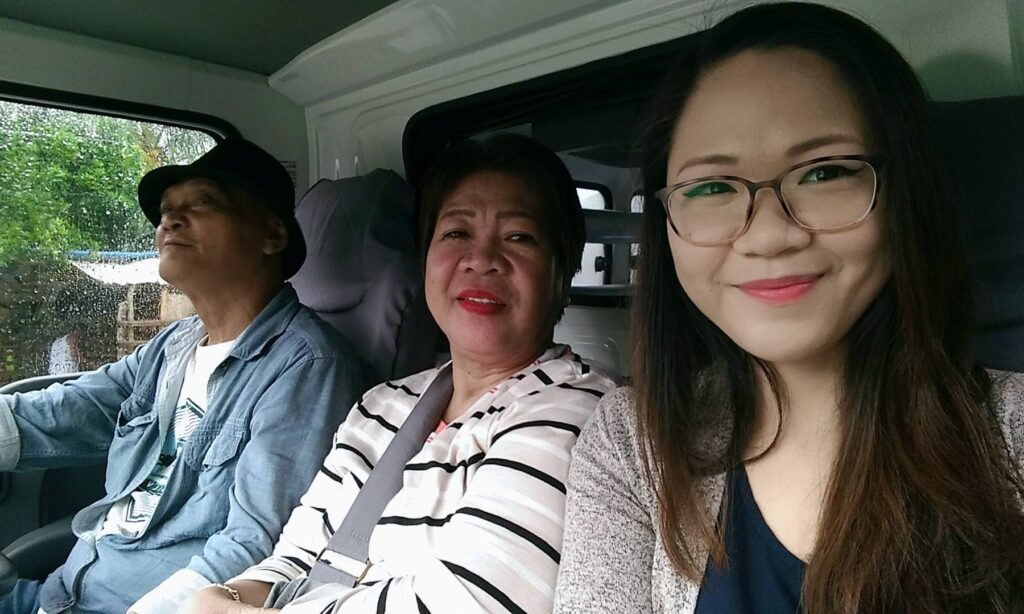
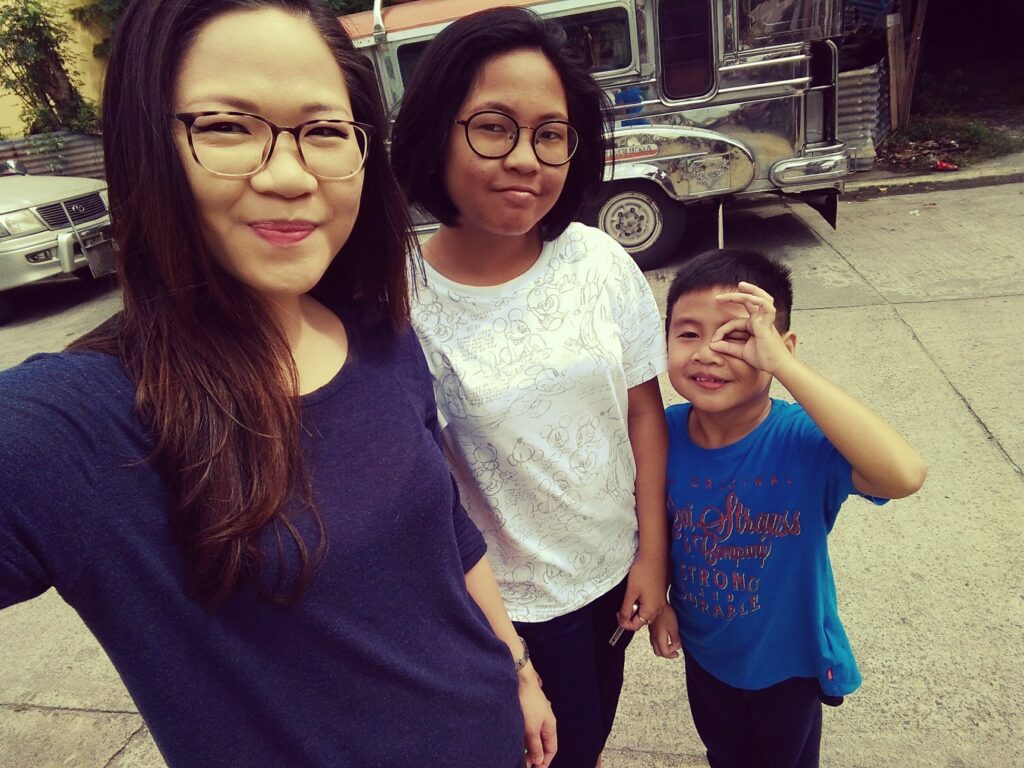
Our parents wanted us to be well rounded. All three of us had to pick a sport and a musical instrument. My sport was taekwondo. I started early and did it until high school. The cardio training for taekwondo required that I run every morning and late afternoon to our neighboring town and back. For my musical instruments, I played the flute and guitar. My brother used to play the drums. So I had a typical Filipino childhood, playing in the streets with my friends and heavily focused on education and training.
Traveling was another big component of our growth and upbringing. We were highly encouraged to travel, explore and expand our horizons.
Tell us about your time as a student. Were there any subjects you particularly loved or hated?
My mom taught Filipino language and grammar in school and I loved listening to her recite poems. I really gravitated towards Filipino grammar, the history of our language, and poetry in the Philippines when I was younger. I think our language is really beautiful.
Then I discovered science in Grade Four and Five. I was really a curious kid and always asked a lot of questions. Our science teacher was amazing. She invested so much time in making learning interesting, in showing us how things worked instead of just telling us. We’d do all these experiments in class, and she encouraged us to go to the field and to museums so we could learn outside the classroom.
I’d say Filipino language and science became my favorite subjects because of my mom and my elementary school science teacher. I enjoyed math a lot too.
There weren’t really any subjects that I hated but there were a few that seemed less interesting and unnecessary to me. We had to draw a lot of buildings in my drafting class. It was really tedious and ate up a lot of my time. Sometimes I’d sleep at 2 am while trying to finish an exercise. I just thought that it was unnecessary to have that as a compulsory subject.
Is there a person who you feel has been influential in you choosing your career path?
Seeing my interest in the subject, my elementary school teacher encouraged me to participate in Science Quiz Bees where I needed to dive deep into the subject and know well beyond what we were learning in the school curriculum. That’s how it all started.
I consider myself very fortunate to have had really supportive mentors in my life and throughout my career. I have a tendency to just throw myself into challenging situations. My mentors have caught me along the way, supported me and led me to the path that I’m on now.
Finding supportive mentors and building strong mentor-mentee relationships can be life-changing. Could you elaborate on how great mentorship supported you along your career path?
So I graduated from Amadeo National High School in the science path, as valedictorian of our class. I applied to the University of the Philippines and was fortunate to get accepted into the biology track for my Bachelors of Science.
I joined Dr. Marline Parungao-Balolong’s laboratory for a project focused on ethnobotany*. Dr. Parungao-Balolong, who sadly passed away last year, was an amazing mentor and a great educator. She advocated for preserving and protecting indigenous knowledge through rigorous scientific testing. We engaged with a lot of indigenous communities to study the medicinal properties of endemic plants in their local area. Dr. Parungao-Balolong has been a great role model for me, being a female scientist in University of the Philippines who became a Department Head. Her last position before her passing was as Assistant Dean of the College of Arts and Sciences at the University of the Philippines in Manila.
After my bachelor’s in biology, during our Recognition Day, our guest speaker was the (now former) senator Edgardo J. Angara**. At that time the senator was chairing the Senate Committee on Science and Technology. On our graduation day, he was interviewing students who had graduated with Honors for positions that supported the Committee. Our Chancellor asked if I was interested in applying and directed me to the senator’s Chief of Staff. When I went up to her, she said “Oh, the Senator would like to speak directly to students”. The senator just asked me one question “Are you interested in research?” And I said “Yes, Sir”. He went “Okay, report to me tomorrow at 8. Bring your resume for my Chief of Staff”. He even gave me instructions on how to get to the Senate.
So my first ever job was in science policy, working at the Committee on Science and Technology in the Philippine Senate. I was tasked with creating explanatory notes for the bills that we submitted to the Committee. It taught me to think deeply about different areas of research, to think about how the science affected communities or the societal benefit it provided.
I’d say the Senator has been another very influential figure in my life. He taught me a lot about how to lead, how to manage time and work on professional development.
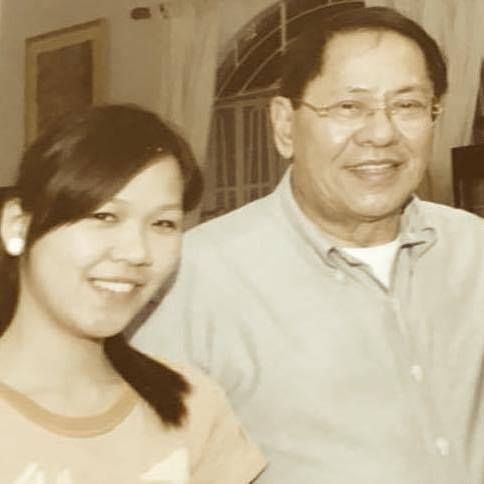
*Ethnobotany is the study of how people of a particular culture and region make use of indigenous plants using traditional knowledge
**Edgardo J. Angara was a Filipino lawyer and politician who served as Senate President from 1993 to 1995. Angara served four terms and championed several landmark laws and bills such as the Senior Citizens Act, the free high school law and National Health Insurance Act during his twenty-three year long tenure at the Senate.
Sounds like a dream job for a 20 year old right out of college! How did this exposure to science policy and impactful STEM research influence your career path?
I was very happy working at the Senate. I got to learn so much while interacting with experts from many different fields during meetings and public hearings. However, I’d sometimes feel inexperienced and underprepared, as though my Bachelor’s was not enough. When I shared this with the senator, he suggested that I look into opportunities for higher education abroad. I remember he said “Make a list of everything that matters to you, not just what you’d like to study next.” At that time being close to home felt really important, I wanted to be able to see my family for Christmas easily. So I decided to look at scholarships in South Korea.
The Embassy of the Republic of South Korea in the Philippines is a fantastic resource for information on scholarships. My friends there suggested the Catholic University of Korea. It has a great international program that combines Biotechnology and Environmental Engineering. I got accepted into the course and took academic leave from the Senate for two years to pursue my degree.
My Master’s advisor was really into climate change mitigation technologies and smart agriculture so most of the classes I took were on remote sensing and satellite imaging. That’s when I started learning how to code. Korea is just amazing in terms of resources and classes. The professors were great and I got to immerse myself in a diverse student community.
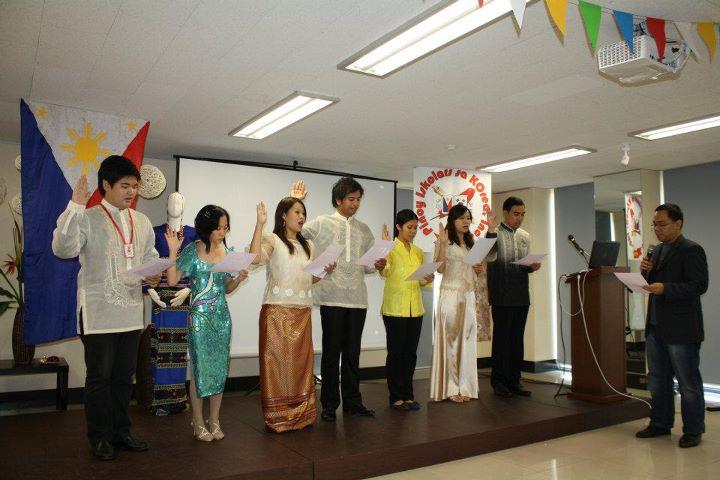
Did you get a chance to learn any Korean?
The language of instruction at the University was English but you had to know Korean to teach undergraduates. My professor needed help in teaching lab classes so I wound up learning Korean when I was hired as an undergraduate teaching assistant.
What came after your Masters degree?
I returned to Manila and continued working at the Senate for sometime. Thanks to my chance encounter with Dr. Joey Comiso, a Filipino American scientist and visiting professor at the University of the Philippines, I got the incredible opportunity to work at NASA.
After attending one of his captivating lectures at the University of the Philippines, I approached him to express my interest in his work and my expertise in remote sensing. Coincidentally, he was looking for team members to process Aquarius satellite data sets, specifically focusing on the colder waters of the Arctic and Antarctic regions. I had initially assumed that I’d be working remotely, but it turns out that I had to relocate to the United States to work at the Goddard Space Flight Center.
What was it like working at NASA?
It was challenging at first, being a young, female, Asian scientist. People often mistook me for an intern. But Dr. Comiso and his team were an amazing support system. Under their guidance, I experienced a steep learning curve during the first six months and devoted long hours to my work, striving to absorb as much knowledge as possible. Everything moved so fast! At the end of my first year there, we had already published a paper on salinity distribution in the Arctic with me as the first author.
After three incredible years at NASA, Joey said “You’re really good at this, you need a PhD.” He connected me to Dr. Max Berkelhammer, my current PhD advisor at University of Illinois, Chicago. Working at NASA laid the foundation for my academic pursuits, and I am immensely grateful for the opportunities and support that propelled my career forward.
Time for a small digression: Many young students are curious about careers at NASA and NOAA. Before we jump into talking about your graduate studies and beyond, were there any courses during your undergrad that you think came in particularly handy later on in your career?
During my undergraduate studies, I took a range of courses that have been valuable in my career. Foundational science courses like botany, zoology, geology, physics, and chemistry were required for graduation. Along with my core science courses, I also focused on statistics and mathematics. I highly recommend building a solid understanding of statistics, as it has proven to be immensely useful for me.
To broaden my knowledge beyond the sciences, I explored courses in humanities and history. Studying Asian history, world history, and Philippine history offered valuable cultural insights and a broader perspective.
I found the communication and writing classes to be incredibly beneficial. These courses enhanced my ability to write speeches, condense complex information into concise explanatory notes, and present my ideas clearly. Strong communication skills are so important in professional settings, including scientific research and policy-making.
Beyond the core curriculum, I pursued additional subjects of personal interest. I chose courses in behavioral sciences, physical education, genetics, ecology, and ethnobotany, which explored the relationship between people and plants.
A well-rounded undergraduate education played a crucial role in shaping my career. The foundational science courses provided me with essential knowledge, while statistics and mathematics proved indispensable in data analysis and research. Humanities courses enhanced my cultural understanding, and communication and writing classes honed my ability to convey complex ideas effectively.
Let’s talk more about your PhD research and your work at NOAA.
For my PhD I’m using remorse sensing to understand changes in carbon cycling along the coastal margins of our planet. The ultimate aim is to assess how the terrestrial and marine carbon sinks could act in tandem with one another to mitigate the buildup of carbon dioxide.
I initially joined NOAA in 2022 as a fellow of the prestigious Knauss Marine Policy Fellowship, which is designed for graduate students interested in ocean, coastal, and Great Lakes resources. As part of this fellowship, I chose to work at the Arctic Research Program at NOAA, focusing on identifying key scientific needs and priorities in the Arctic. This experience was so enriching and such a good fit for my skill set that NOAA offered me a position as a program manager working on Arctic research and data management when my fellowship concluded.
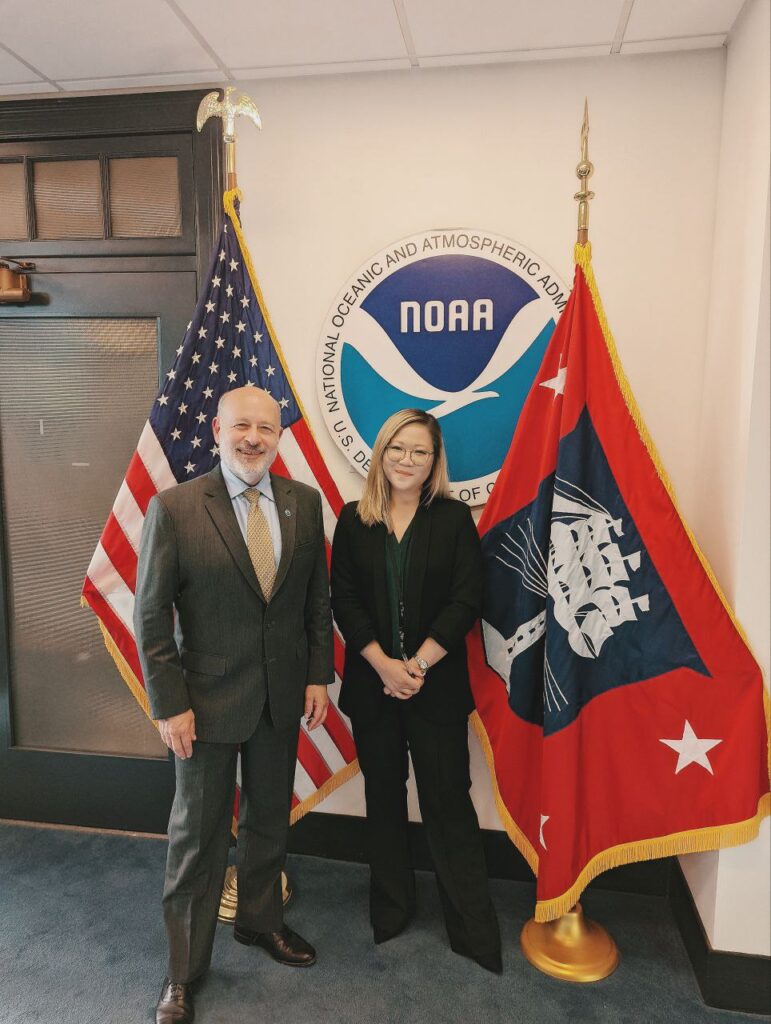

What are you most excited about in your current position at NOAA?
As a program manager, I work on funding initiatives that address scientific priorities in the Arctic through our program portfolio. I also have a strong focus on data management, particularly in making the data we produce through research projects more accessible and usable. I advocate for open and accessible data, empowering not only scientists but also the broader public to utilize the information that has been funded by taxpayers. Having gone through the challenges of interpreting signals from space and navigating various languages and tools, I understand the importance of making data user-friendly and easily understandable.
I am really excited about connecting marine science to real-world impacts and working towards building coastal resilience, particularly in vulnerable communities. We need to recognize that what happens in the Arctic has far-reaching implications, even for countries like the Philippines, which is heavily affected by major typhoons and other extreme weather events.
What are your plans for the future?
I’ve experienced the entire spectrum of science from asking questions to collecting data in the field- I went to the Arctic on an icebreaker to gather data- to looking at data from satellites and analyzing this data using lines of codes. For me what makes for a well-rounded scientist is to be able to connect data products and services to societal benefit. I am passionate about building a career that combines data science with policy and ensuring that there’s equitable distribution of data and information to communities that need them the most. Over the next decade, I would like to develop myself as a leader in this field both within NOAA and by fostering inter-agency collaboration.
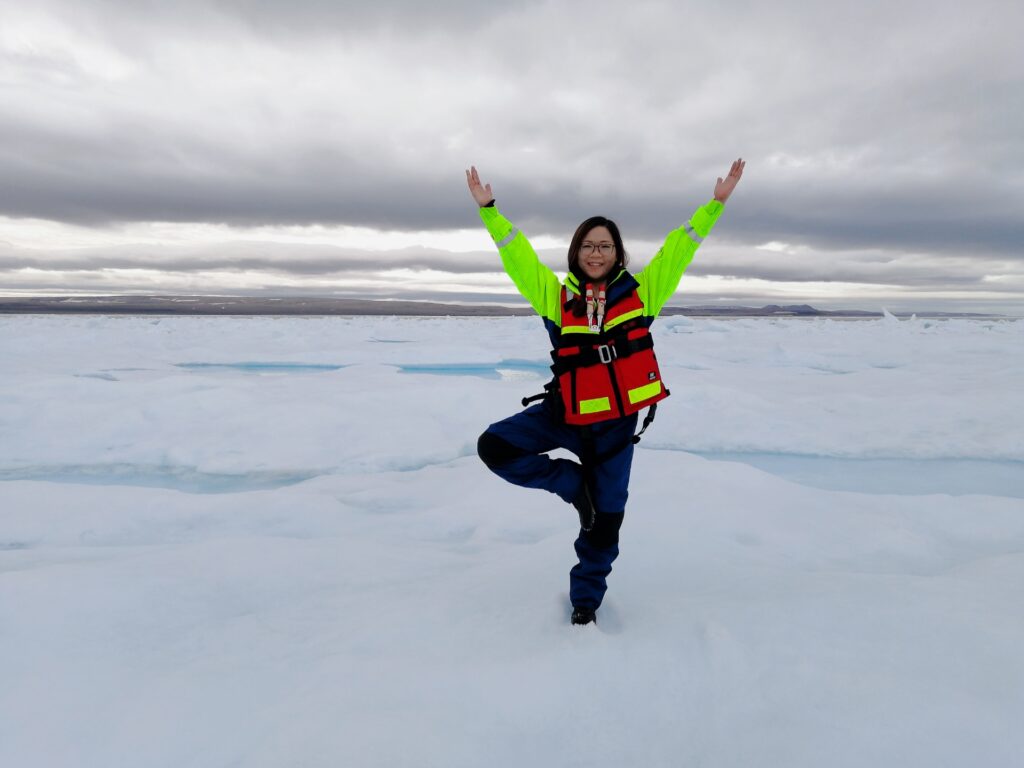
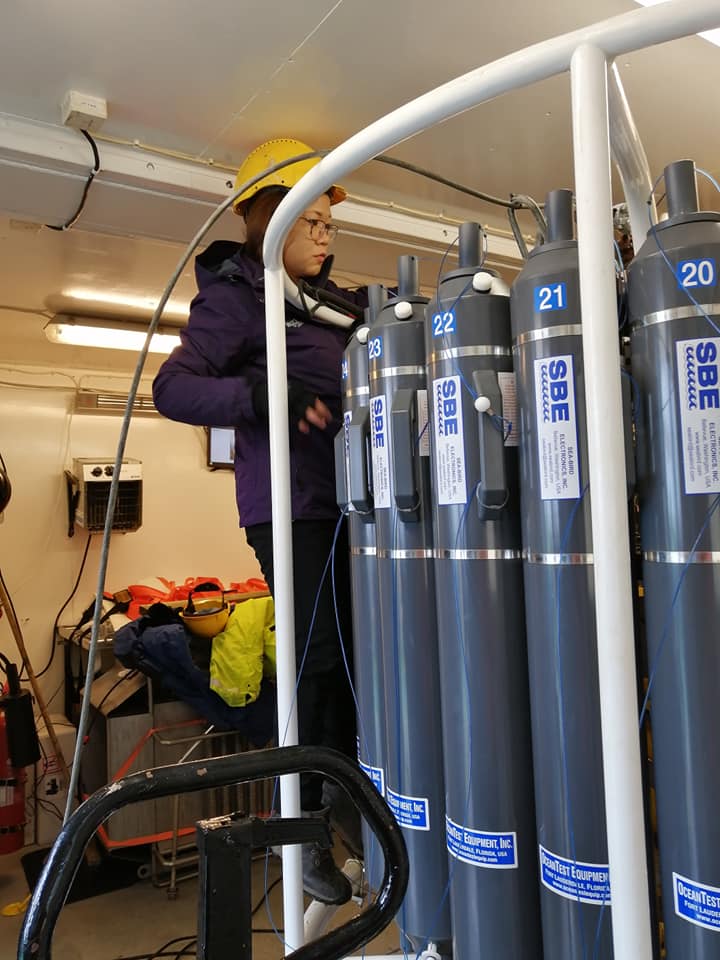
I am Co-chair of the Advocacy Committee at the Association of Filipino American Scientists (AFSA). I’d like to continue helping minoritized students through AFSA’s programs. I also really enjoy working with GradMAP, which is a volunteer driven group aimed at helping Filipino undergrads apply at grad schools outside the Philippines. Eventually, I want to start a nonprofit for environmental engineers that’s focused on building climate resilience in the Philippines.
Let’s talk about your experiences as a woman of color in STEM. Pursuing a career in academia comes with its unique set of challenges. Do you feel you have equal opportunities compared to your male counterparts? How has being a woman in science impacted your scientific career?
I grew up in the Philippines, in what has historically been a patriarchal society. When I first started working at NASA, it was really challenging to find my voice while entering a room filled with men. But the more I immersed myself in these situations, the easier it got to see where I fit in and to speak my mind. It took introspection and knowing my strengths and weaknesses. Recognizing where I should improve myself and honing in on what I’m really strong at helped me both as a person and a worker.
The biggest lesson I’ve learnt is that you shouldn’t force yourself to be like other people. You are a mosaic of your culture, your history, your upbringing and your experiences. I embrace that and don’t pretend to be anyone else. I tell people who I am and what I’m passionate about. I’ve found that people respect this and are eager to support you because you’re genuine and honest about what you want to pursue. There are definitely situations that will sap your energy. For instance, when everyone thought I was an intern at Goddard. But eventually, I was presenting at meetings and talking about my science. When you work on presenting your authentic self to the world, you don’t have to work hard to be seen.
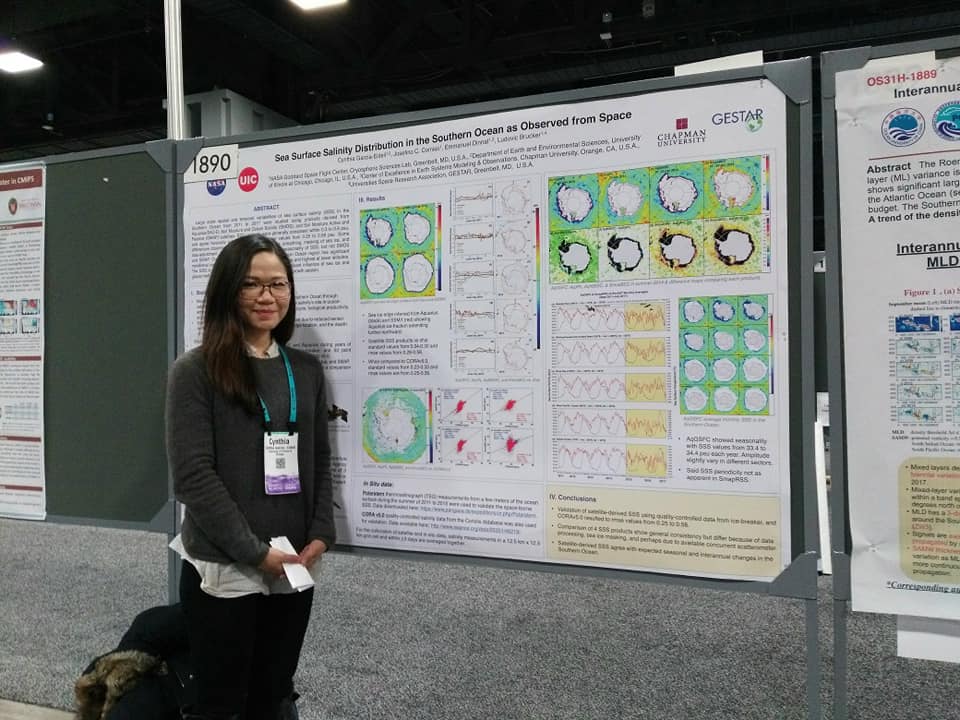
Is there anything that you wish that you could change in your field to make it more inclusive for women of color?
Coming from a patriarchal society, I’ve always understood the need to empower, connect, and help minoritized groups in STEM, be that other Filipinos or women in science.
I’m a big believer in “You can’t be what you can’t see”. Having the right role models and really great mentors supporting me made a huge impact on my career. My undergraduate mentor, the late Dr. Marline Parungao-Balolong was instrumental in my development as a Filipino scientist.
As a mentor myself, I’ve realized that sharing my own experience as a woman of color in my field plays a huge role in making other women like me feel less alone. I cherish peer mentorship. Developing peer networks and learning from each other is essential. I’m really fortunate to be part of a fantastic peer network. NOAA is really striving to make the work environment more inclusive- not just for women of color- but for everyone, regardless of race, gender or religion. Our team is composed of nearly 80% women. Really amazing, empowered women. We hold regular ‘Women in Science Leadership’ workshops where we get together to share stories and talk about any challenges we’re facing. For example, negotiating a salary is something that’s typically harder for women. At the workshops, women share tips for how to do this or even letters they had drafted while negotiating a raise. So I believe that having platforms available where you learn to advocate for yourself are key to long-term change.
Academic careers can be very demanding. How do you take care of yourself on the daily?
I think that having some sort of hobby or sport that relaxes you is important. For me that’s rock climbing. It suits my personality, as more of an introvert, because it’s a one person thing, and it’s very zen. My partner is amazing in terms of just sitting on the couch and relaxing or traveling together and making memories. We also have a dog who is a great break after work. And then there’s yoga. Yoga is great for releasing endorphins. I would say exercise, having a dog and a caring partner keep me going.
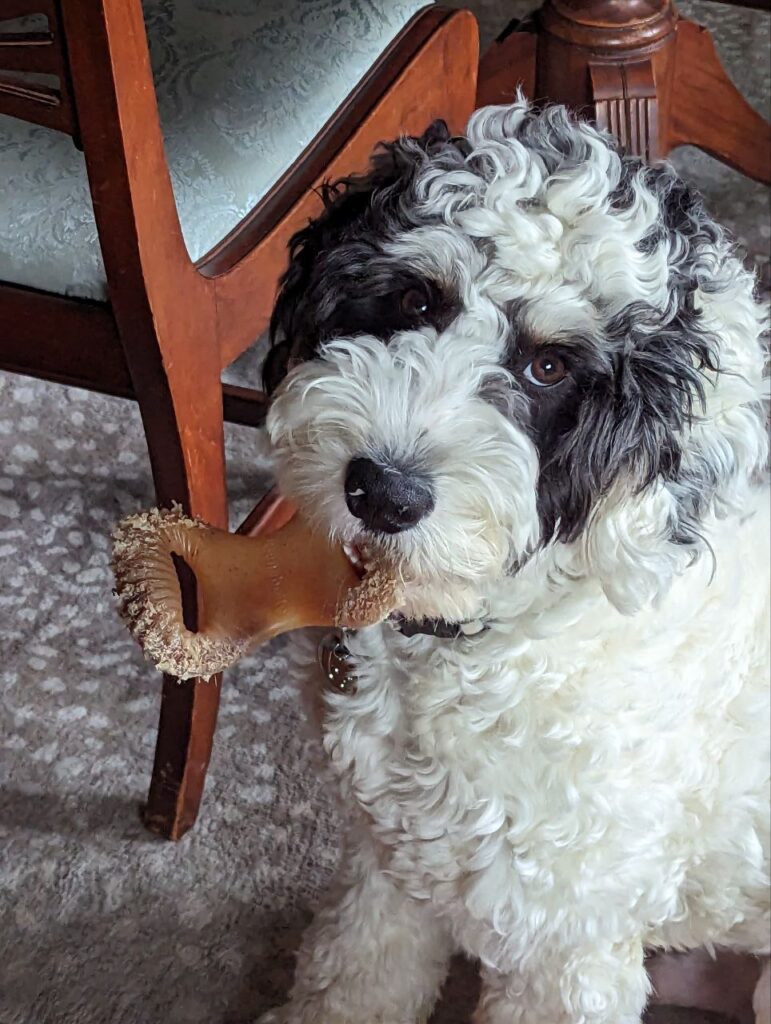
When you’re not working, where can we find you?
You can find me walking my dog in the park.
Rapid Fire Round
What’s the first thing that comes to your mind when I say ‘space’?
Opportunities
If you were a plant or an animal what would you be and why?
I would be a dog because they’re very loyal, smart and loving.
What two non-essential items would you want with you if you were shipwrecked on a deserted island?
I would say a picture of my family and a fun board or card game for one.
Photos courtesy of Cynthia Garcia-Eidell.

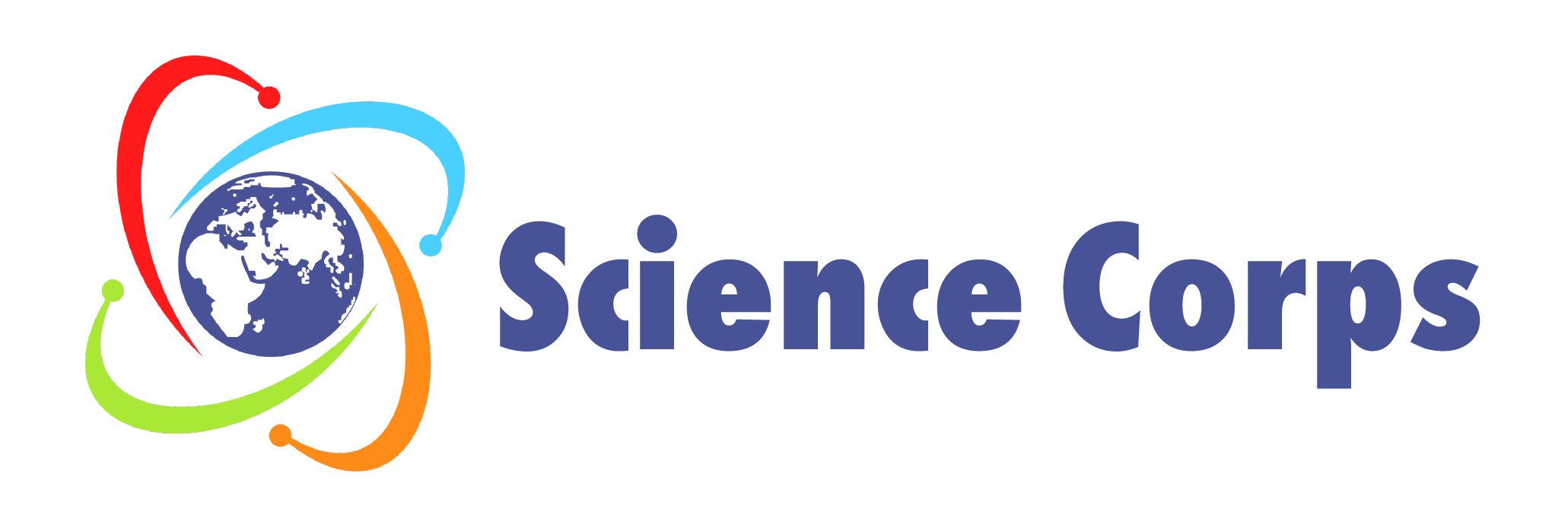
Leave a Reply